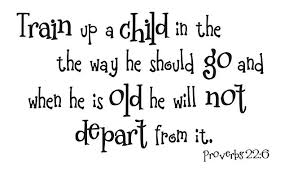 Train up children in the way they should go, and when they are old they will not depart from it.” I grew up in a religious household, and this verse from Proverbs was one of the more oft-quoted sayings around our home. The interpretations of this idea are manifold, but the favorite one of my parents was that if they were diligent in teaching me the tenets of their faith, then, when I got older, I would be one of the faithful.
Train up children in the way they should go, and when they are old they will not depart from it.” I grew up in a religious household, and this verse from Proverbs was one of the more oft-quoted sayings around our home. The interpretations of this idea are manifold, but the favorite one of my parents was that if they were diligent in teaching me the tenets of their faith, then, when I got older, I would be one of the faithful.
It’s a reasonable thought, but in my case, it didn’t quite work out that way.
Another way of thinking of about this verse is that, perhaps, it is speaking to discipline. If we, as parents, set well-defined boundaries like bedtimes and dietary rules (you have to eat your vegetables, etc.) and encourage our children to be ethical little people, then one day they will grow up to be ethical big people who go to bed at reasonable hours and live relatively healthy lives. This is another plausible concept, but I’m not convinced it works in every case.
I have known wonderful parents who set boundaries, provided consistent discipline, and cooked healthy meals only to see their children become alcoholics, drug addicts, or obese. And while it is true that parents have a lot of influence over children when they are young, recent research suggests that by the time they are teenagers, the biggest predictor of their future is the company they keep, their friends. So how much training can a parent really do?
One of my favorite interpretations of the “train up children in the way they should go” idea is that, as parents, we should be on the lookout for talents that our kids possess, and we should foster those. In this case, the “way they should go” is basically the gifts that they have, and as parents, our job is to nurture those gifts and see that they are given every opportunity to flourish. But even this noble idea is not without its limitations. Nurturing some talents requires a great deal of resources that some parents simply don’t have.
We don’t like to think about it, but it’s entirely possible that someone with the potential to be the next Yo Yo Ma will never get the chance to perform because the requirement to tend to their basic needs will only be satisfied if they pursue a career in insurance or automotive maintenance or some other profession that is miles away from the concert hall. And if resources aren’t an issue, it’s easy to go too far in nurturing a talent. Amy Chua’s “Tiger Mom” article caused a great stir when it was published in The Atlantic because many people saw the hovering, tenacious, pressure-packed method of parenting she advocated as borderline child-abuse.
So, what is a parent to do with this responsibility to raise a child? What does this duty entail? As a person who has been parenting children for over a decade, I can confidently answer that question like this: I have no idea. I really don’t. If there is some grand method of parenting that guarantees that one’s children will grow up to fulfill their potential and live relatively happy and healthy lives, I would love to learn about it. In my experience, methods of parenting don’t even translate well from one child to another, so my parenting methods are specific to the needs and abilities of my individual children.
And even though “style” and “method” are often used as nouns that the adjective “parenting” modifies, they don’t accurately capture the meaning of the verb “parenting.” Which stands to reason, when you think about it because parenting is a relationship, and a relationship between two people can’t be defined. It’s something that has to be experienced for it to make any sense.
The interesting thing about relationships is that they are never one-way. There is give and there is take. There is speaking and there is listening. There is intimacy and there is distance. All relationships are ultimately a kind of communication and involve a willingness to be changed by the other person. And make no mistake about it: relationships change their participants.
Perhaps training up a child is mostly about fostering a relationship. Maybe good parenting is mostly about showing a son or daughter how to love and how to be loved. Maybe it’s about helping our children find their own voices so that they can participate as best they can in this grand conversation we are having. And maybe the best parent is one who is willing to be changed by their children. Because parenting does change a person, I believe that my parenting relationship with my children has changed me into a better person than I otherwise would have been.
As far as training up a child in the way they should go is concerned… I train my children to share, and they train me to have patience. I train my children to try hard, and they train me to remember to play. I train my children to tell the truth, and they train me to embrace the moment. I train up my children in the way they should go, and they train me right back.
